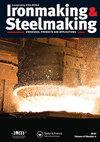Analysis of macrosegregation during slab continuous casting using 3D-longitudinal 2D hybrid model
IF 2.2
3区 材料科学
Q2 METALLURGY & METALLURGICAL ENGINEERING
引用次数: 1
Abstract
ABSTRACT To improve the computational efficiency of simulating the macrosegregation process that occurs during continuous casting of steel slabs, a new hybrid method combining three-dimensional and longitudinal two-dimensional models was developed to consider the turbulent flow, heat transfer, solidification, and solute transport phenomena. The reasonability of the performed computational domain division was determined, and the model accuracy was verified experimentally. Using this approach, the solute distribution characteristics and central segregation during continuous casting were examined in detail. The obtained results revealed that recirculation flows in the turbulent flow region play a critical role in the distribution of solute elements near the slab surface. Owing to the redistribution of solute elements at the solid–liquid interface and the movement of the solid–liquid interface towards the slab centre during continuous casting, the solute elements in the slab centre are continuously enriched, ultimately resulting in central segregation.基于三维-纵向-二维混合模型的板坯连铸宏观偏析分析
为了提高模拟板坯连铸宏观偏析过程的计算效率,提出了一种结合三维和纵向二维模型的混合方法,考虑了湍流、传热、凝固和溶质输运等现象。确定了计算域划分的合理性,并通过实验验证了模型的准确性。利用该方法对连铸过程中溶质分布特征和中心偏析进行了详细的研究。结果表明,湍流区的再循环流动对板坯表面附近溶质元素的分布起着至关重要的作用。在连铸过程中,由于固液界面处溶质元素的重新分布以及固液界面向板坯中心的移动,导致板坯中心处溶质元素不断富集,最终导致中心偏析。
本文章由计算机程序翻译,如有差异,请以英文原文为准。
求助全文
约1分钟内获得全文
求助全文
来源期刊

Ironmaking & Steelmaking
工程技术-冶金工程
CiteScore
3.70
自引率
9.50%
发文量
125
审稿时长
2.9 months
期刊介绍:
Ironmaking & Steelmaking: Processes, Products and Applications monitors international technological advances in the industry with a strong element of engineering and product related material. First class refereed papers from the international iron and steel community cover all stages of the process, from ironmaking and its attendant technologies, through casting and steelmaking, to rolling, forming and delivery of the product, including monitoring, quality assurance and environmental issues. The journal also carries research profiles, features on technological and industry developments and expert reviews on major conferences.
 求助内容:
求助内容: 应助结果提醒方式:
应助结果提醒方式:


